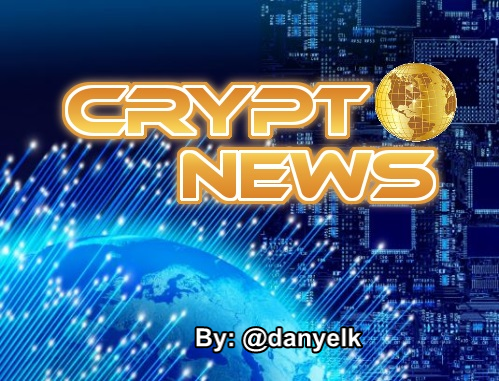Your Crypto News on Steemit December 9, 2017

- Western Union obviously blocks Cryptocurrencies
- 'All-You-Can-Fly' Airline Surf Air accepts Bitcoin and Ether
- Australian Securities Exchange is switching its System to DLT
- Lightning: Integration Tests completed, first Transaction on Bitcoin Mainnet successful
- Alan Greenspan: Bitcoin like former American Colonial Currency
- Dr. Larry Sanger joins Everipedia Team



The financial services provider Western Union seems to be blocking new transfers as soon as they have anything to do with cryptocurrencies. One could not reconcile this with the internal regulations of the enterprise, was the reasoning. This was recently communicated to the employees of the international online trading center Kraken.
As reported by [coindesk](https://www.coindesk.com/western-union-reveals-pilot-coinbase-integration/, technical director David Thompson said in the summer of this year that the blockchain technology and cryptocurrency are positive. According to Thompson, Western Union (WU) is prepared for the moment when one day it would no longer be possible to close oneself to digital currencies.
The posting of the Kraken support at Reddit now speaks another language half a year later. Kraken employees have been told by Western Union that they are no longer completing transactions as soon as they obviously have anything to do with cryptocurrency. This would contradict the company's guidelines, which is why the transaction was stopped. The credit has therefore been fully reimbursed by Western Uniton to the sender, as reported by news portal Cointelegraph.
The posting of the Kraken support at Reddit now speaks another language half a year later. Kraken employees have been told by Western Union that they are no longer completing transactions as soon as they obviously have anything to do with cryptocurrency. This would contradict the company's guidelines, which is why the transaction was stopped. The credit has therefore been fully reimbursed by Western Uniton to the sender, as reported by news portal Cointelegraph.
I've been in touch with the UK branch's press and communications department by email since Wednesday morning to hear first hand. The answer only came in yesterday night because it had to be obtained first from the parent company in the United States. On my specific request for Kraken the e-mail is only superficially, the marketing employee of Western Uniton has done their homework.
As usual with official statements, this can mean anything or nothing, at least it is not a denial. If the statement of the Kraken employees is confirmed, this would certainly have some negative effects on suppliers such as Coinbase, Kraken & Co. Or, at some point, consumers will proceed to carry out their transfers to the Third World entirely by means of a cryptocurrency. Of course, this is anything but barrier-free. The money also does not arrive via Bitcoin within a few minutes. But in terms of fees, this would undoubtedly be very attractive. Western Union has been repeatedly criticized in recent years for charging its customers high fees for their comparatively fast transfers.


Surf Air, the world's largest all-you-can-fly flight operator, announced late last week that it would accept Bitcoin and Ethereum as a form of payment for its monthly membership and charter offers.
This represents an important milestone in aviation, as a travel provider can successfully begin to accept cryptocurrencies for the first time. The private airline allows its users to pay for their places using the two crypto currencies via a mobile app. The airline serves several cities in California, Texas and Europe, according to the press release.
Meaning for Surf Air:
CEO Sudhin Shahani, said in a statement to accept Bitcoin and Ethereum, was part of their broader efforts to shake up existing airline services.
Sudhin Shahani also said:
Airlines, especially smaller, regional, are not averse to the crypto currency world. Some of them have started to accept Bitcoin over the years. The aerospace industry has also begun to explore applications of blockchain, including ticketing and maintenance tracking.


The Australian Securities Exchange, the largest exchange in Australia, has announced that it will convert its self-developed clearing house electronic sub-register system (CHESS) to distributed ledger technology.
For the planned conversion, the Australian Securities Exchange has teamed up with the start-up Digital Asset to develop their new system.
CHESS is an electronic register for hedging and documentation of stock exchange transactions. It was already developed in 1990 to store information on share certificates, securities transactions and clearing. At that time, it was all about replacing the documentation on paper and thus creating more clarity and less effort.
The new system is operated by ASX in a secure private network where participants are aware of
"Allowed" to have access and must adhere to ongoing and enforceable obligations. The system will provide access barriers to unrelated market participants and clearing and settlement Settlement facilities. ASX customers are given the choice of how to use ASX's post-trade services. Customers will be able to connect in a similar way as they do today
Global ISO 20022 messaging, or they can interact directly with the distributed ledger. The transitional period to the new system will be defined in consultation with the stakeholders.
Australian Securities Exchange is positive
In their press release the developers emphasize above all that the conversion of the old system to Blockchain is to guarantee a higher functionality. It also praises the benefits of the technology to provide greater transparency while ensuring safety.
Dominic Stevens, Australian Securities Exchange said:
With their message, they confirm their announcements that they made earlier in the year. The period of change should take place in coordination with the stakeholders. Together with stakeholders, the company now wants to enter a final test phase. By the end of March next year, the system will be available to the public.
Especially with regard to the futures planned by Nasdaq last month, further involvement of the financial system and blockchain technology will take place. Especially in Australia, the developers encounter fertile ground. Among other things, the government has announced that it will lower the tax hurdles for cryptocurrency trading. In addition, it has also been thought about switching the regulation itself to blockchain.


Three teams collaborate to develop Lightning and independently build clients for the offchain network. With the completion of the integration tests and the first payment in the real Bitcoin network, the developers reach two milestones this week. We do not let us rag - and accept donations to the blog with Lightning.
Lightning, the protocol for offchain payments, is formed by three developer groups: ACINQ, Lightning Labs and Blockstream. These groups each develop their own client for the Lightning network. Since the Scaling Bitcoin conference in Milan, the teams have been working closely together to ensure that the three clients are compatible. That's why they wrote the Lightning specification.
On December 6, 2017, the integration tests issued by Christian Decker have reached their conclusion. The three independently developed clients are fully compatible; The specification has proven itself and now gets the version number 1.0. According to Rusty Russel and Christian Decker of Blockstream, this represents a milestone in the development of Lightning.
At the same time, the Lightning developers are announcing in a joint announcement the first Lightning transaction in the official, real Bitcoin network. So far, Lightning transactions were only feasible in the Testnet.
They tested eclair (ACINQ), c-Lightning (Blockstream), and lnd (Lightning Labs). They've set up nodes around the world, including Asia, Europe, South America, and North America. In their first test, they used the Coffeeshop Starblocks, an eclair application. Starblocks accepted an incoming Bitcoin payment from a customer who paid with the lnd Lightning app as a client and was routed via c-Lightning. Mmm, blockaccino!
Image source: starblocks
A second test was made with yall.org, a micropayment site. For this, the developers have sent a payment with eclair and routed through c-Lightning. This too has worked smoothly.
Zap, HTLC, lnd
This should make payments with the Lightning network a little closer. If you want to get more involved with the matter, you should start with the Yalls.org platform. There you can unlock for a small payment a currently manageable amount of items. Yalls links to three wallets to pay for: the Lightning Labs desktop app, the online wallet HTLC.me, and Zap.
I tried the online wallet HTLC.me. The Wallet gives you a small credit, with which you can pay via lightning. One payment to Yalls.org worked - which was an interesting experience since the payment was instantaneous - the second was not due to any connection issues. You can receive Bitcoins with HTLC.me only via lightning, which is why I could not try out how to charge a lightning channel.
However, Zap does not have a release yet, and Ind needs, as far as I understand, a fully synced btcd node. Eclar promises to integrate lightning into a nice user interface, but currently only runs on the testnet. The developers warn against using it for real money because it is still an alpha software. But it might already be possible to redirect it to the Bitcoin Mainnet, if you know what you are doing.
For those who wait for lightning, completing the compatibility test is a big step forward, making Lightning a whole lot more reality. However, one should beware of too high expectations. Because even if the software runs smoothly and is published, first a network must first form in which the credits are routed. How this will look - decentralized or centralized - is yet to say. It may take a while until lightning really hits.


Alan Greenspan, the former chairman of the US Federal Reserve, feels Bitcoin is reminiscent of the currency that was created in the United States during the colonial era.
In an interview with the American news channel CNBC, Greenspan said that Bitcoin is comparable to the currency of the North American colonies published in 1775. This currency, known as the Continental Currency, was the first currency in the colonies independent of Great Britain that would later become the United States.
The currency was used during the American Revolutionary War to underline American aspirations for independence. In addition, the money also served to finance the war. The currency consisted of paper money and was not - as was usual then - covered by gold or other equivalent values. In 1782, however, after the war, the currency became worthless.
The parallel that Greenspan sees between the colonial currency and Bitcoin is that the currency is not covered by real assets. However, he does not automatically conclude that the Bitcoin threatens the same fate that would have to endure the American continental currency. Rather, he highlights the psychological dimension of money.
He said:
The question of the intrinsic value of Bitcoin and other cryptocurrencies has been asked many times. In Part 8 of my series "The 10 Biggest Myths of Cryptocurrencies", I have also dealt with this question in more detail.


As PRNewswire reports, Dr. Larry Sanger, one of the co-founders of Wikipedia, joined the development team of Everipedia.
The blockchain encyclopedia is a decentralized counter-proposal to Wikipedia. The platform is an open source network that originated in Los Angeles. One of the special features is that anyone who writes articles becomes part of the network because they are rewarded with tokens.
The studied philosopher Larry Sanger is considered a technology pioneer, not least because he was involved in the largest digital library Wikipedia from the beginning. He is partly responsible for the name of the encyclopaedia and its original corporate principles.
Dr. Larry Sanger explains:
Everipedia wants to democratize knowledge
The development team also announced that they are working on a peer-to-peer wiki network. Above all, they want to work with incentives and an open structure. By doing so, users receive tokens for curating items - much like bitcoin mining. Thus, all participants can become stakeholders of the network - the value of the tokens is linked to the value of the network. So the goal of this system is to democratize the original Wikipedia model. In addition, the founders and developers want to create an incentive system that improves the quality of articles by motivating authors with monetary incentives.
Travis Moore, co-founder of the platform says:
The model is already successful. With over 3 million monthly visitors and over 6 million articles, the blockchain encyclopedia has already overtaken the English-Language Wikipedia in terms of content volume.

I wish you all a lovely Saturday and a great Weekend!!!
ⓁⓄⓥⒺ & ⓁⒾⒼⒽⓉ
Best regards
@danyelk
.gif)


Thanks for the post and information, time for cryptos to go mainstream :)
future is bitcoin.
Good information danyel 👍
And i am happy for relationship friend with you
Really good and good👍👍👍
Now everyone is very interested in the cryptocurrency and steemit.
Because their future is very bright.
We are the best news for those cryptocurrency and steemit trader.
So thanks for sharing this news with us @danyelk
My Greetings!
My name is Natalia and I’m a community manager of the TravelChain project.
Our team really like your blog about crypto news, bitcoin, blockchain and your opinions about that. I really admire all the efforts you put into making such an amazing and unique content! I would be happy if we could work together.
The thing is, right now I'm looking for enthusiasts who will share the same interest in blockchain startups as we do. We're creating our decentralized travel database on our OWN BLOCKCHAIN. There are a lot of things I can tell you about our project, team and what we’ve already achieved. You can find the information by this link: https://bitcointalk.org/index.php?topic=2364466
In addition, if you will be interested in our project, I would like to talk about cooperation in our bounty campaign (of course, with reward).
I hope to hear back from you soon!
Thank you very much you did wrote a few days back to me about that I told you that I need to find the time to help you guys. For the moment I am very busy working on a project of my own and I do the crypto news here on steemit so time is a bit rare. What you can do is tell me in what way I could help you and I will see to find a bit time to start working on what ever you need.
You can send me an e-mail with info [email protected]
Best regards Danyel